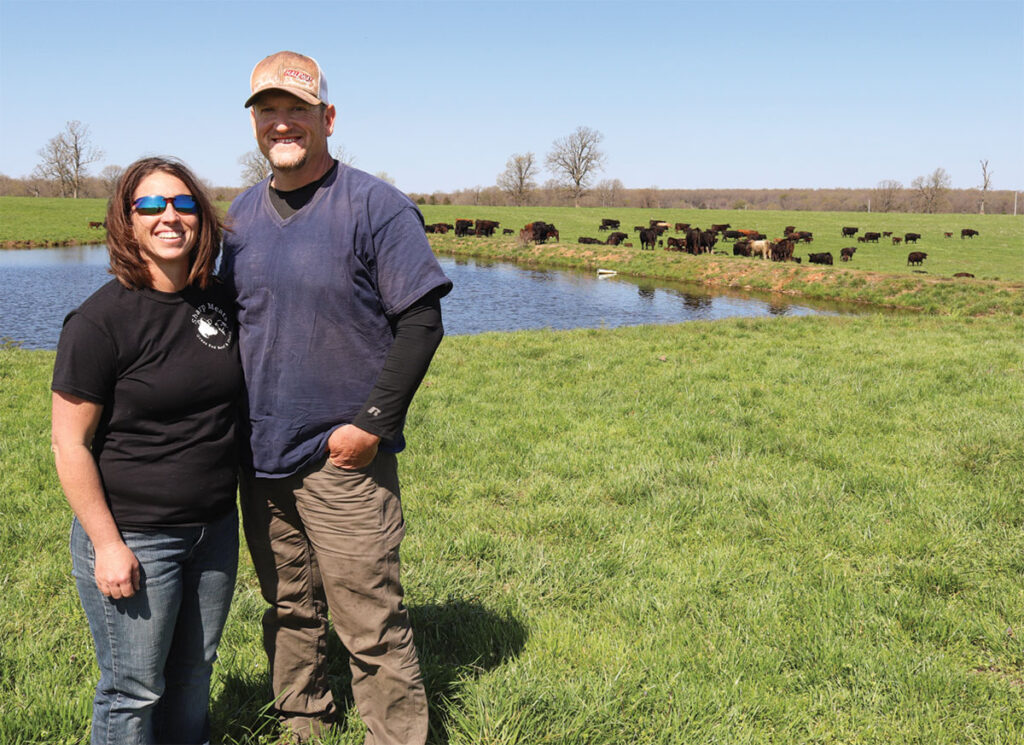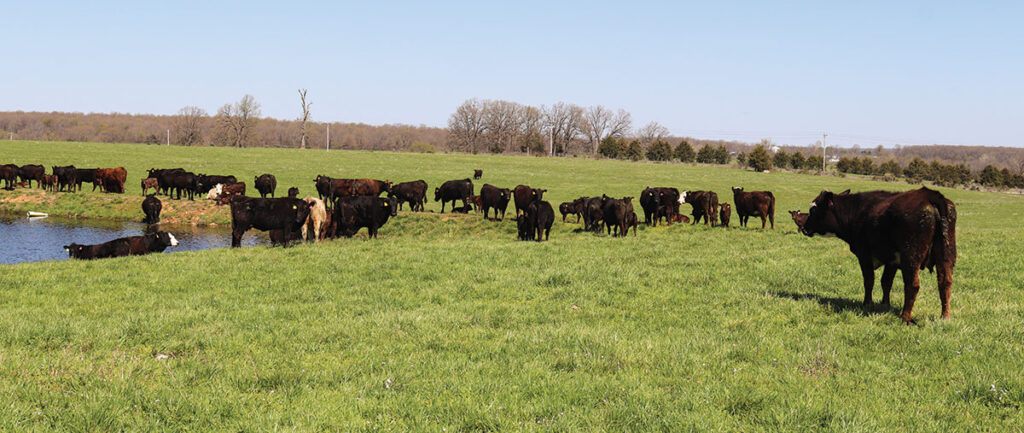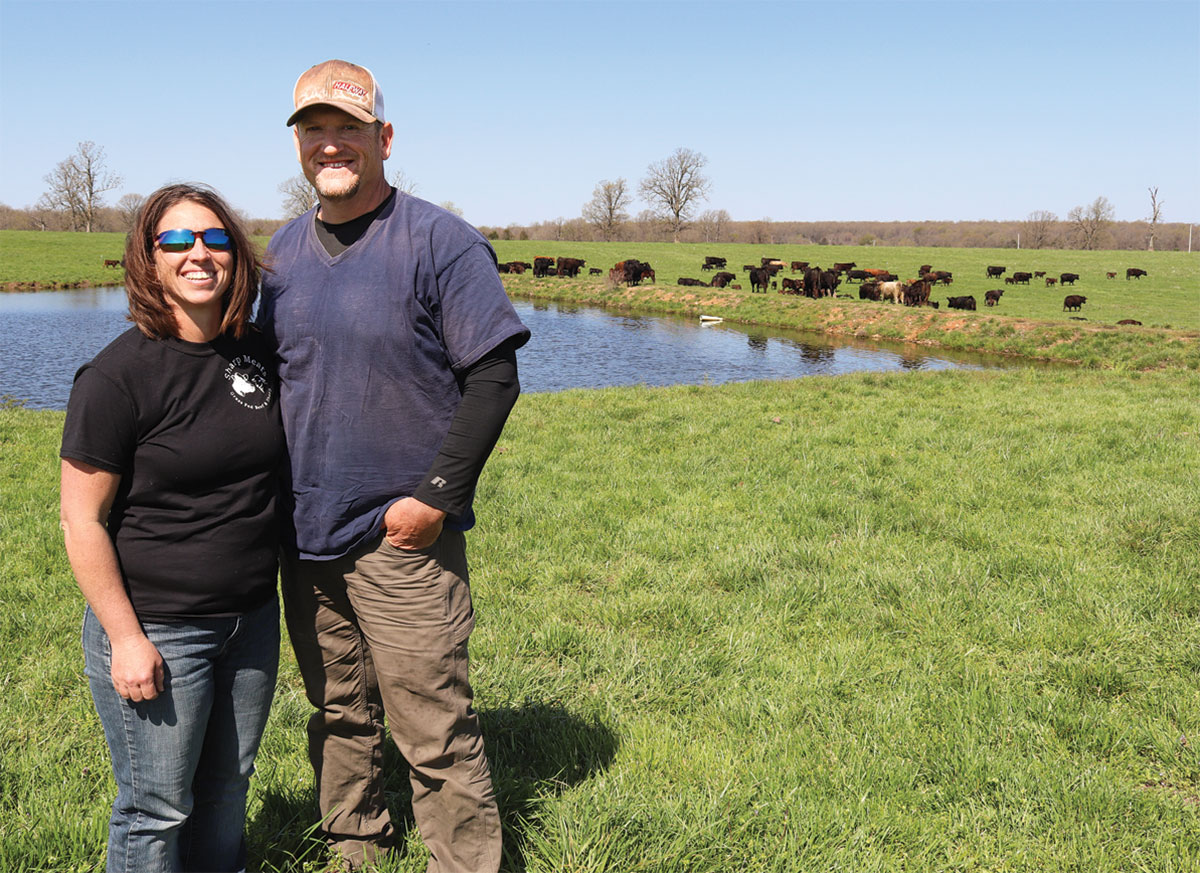
Jody and Alisha Sharp launch Sharp Meats to offer customers farm-raised, grass-finished beef and lamb
HALFWAY, MO. – When Jody and Alisha Sharp got married, they started their cattle herd with 25 cows, and have continued to grow their operation.
“My ultimate goal was to take calves all the way through the feed yard,” Jody said. “We were finally able to do that for a couple of years and we went out to the feed yard twice to see them, and both times they were just laying in mud.”
Alisha added there was no explanation of the veterinary treatment or why some of their cattle died.
After the feed yard experience, the Sharps tried a feeding facility closer to home, but they still weren’t satisfied. They asked a field rep if they could keep their cattle at home in a pastured situation, but the suggestion was turned down.
“They said the fat in the meat will turn yellow, and the consumer won’t buy it,” Jody said. “I just got so frustrated. To have more control, I had to take them from point A to point B and not have anyone in between.”
That realization launched the creation of Sharp Meats, focusing on grass-finished beef and lamb. Offering farm-raised beef and lamb is nothing new to the Sharps, but they are now branching out into individual cuts and specialty items, such as beef sticks.
“We’ve sold to people Alisha works with, friends and families for years, but to afford for it to be bigger, we had to figure out another way,” Jody said. “If you want to buy meat from us, you can come out and see how it was raised, vaccinated and treated. To me, that’s the way society is moving. If you take a calf to the sale barn, you have no idea where it’s going.”
Sharp Meats is still in the fledgling stages, but the website is building interest.
“A lot of people we talk to say you have to be in it for two years for a lot of traction, and I think we are starting to see that traction and are moving forward,” Jody said. “You don’t know how much you’re going to sell or how often you will need it, so you don’t want to have a whole bunch of meat you aren’t selling.”
Jody and Alisha continue to offer wholes and halves to beef customers and will also grain-finish an animal upon request.
The couple typically run about 250 to 300 pairs, but dropped to about 260 pairs in the wake of last year’s drought. All animals that go through the beef program are from their Angus/Gelbvieh herd.
Calves are weaned at 6 to 7 months of age and receive an on-the-farm produced alfalfa and triticale baleage. After about two weeks, calves go back to grass.
“Feed costs are getting crazy, so if you can manage it to where you don’t have to buy any, that’s just putting more money in your pocket.”
Grass-finished calves are processed at about 800 pounds.
“That’s the ideal weight we are going to shoot for, but we won’t be in a hurry to get rid of them or take them to the sale barn,” Jody said. “If they end up being 1,000 pounds, that’s OK. Every calf gains at a different rate.”
Cattle receive mineral supplements and are vaccinated annually. Calves receive a Nasalegen with PMH as newborns and again at weaning to reduce respiratory issues and pink eye.
While the goal is to sell as many calves as possible through Sharp Meats, Jody and Alisha know it is impossible to market all of their calves, so some do go to the sale barn.

“Our expectation isn’t that we’re going to wean 250 calves and sell all 250,” Jody said. “I would love to do that, but it’s not realistic, especially in the early stages of this.”
Most of the Sharp herd is spring calving, with only a small group of females set up for fall calving. Angus and Gelbvieh bulls are used with the herd.
“I just like that hybrid vigor,” Jody said, adding that the carcass quality has been high. “The guy we fed through has called four times, and he just wants to buy our calves and feed them himself.”
They recently purchased bulls with a higher marbling score to improve carcass quality.
Cattle are rotated through paddock systems located across the farms the Sharps own and lease.
“At the grazing school, they said you could run 15 to 20 percent more animal units per acre,” Jody said. “I remember thinking that’s not possible because there is only so much grass out there. I found out they were exactly right because I’m running about 15 percent more than I used to.”
By allowing rest periods, the couple said their forages are thriving.
“They can’t keep up with it,” Jody said. “When we’re done grazing an area, we leave grass.”
The amount of hay fed in the winter has decreased with the implementation of the grazing program.
“Between us and my brother-in-law (Alisha’s brother Andy Doak who is partners with the Sharps on some farming endeavors), we have 550 to 600 cows, and we plan on keeping 500 bales of dry hay just for the cows. The old saying is to keep three bales per cow for winter, and we’re barely keeping one.”
Poultry litter is the primary fertilizer for the farming operations. No commercial fertilizer has been purchased for at least eight years. Jody said he has learned soil filled with earthworms is healthy spoil, and chemical fertilizers can kill earthworms.
Additionally, the Sharp herd requires no deworming because of the rotational system, which can support two cows per acre.
One hundred and fifteen-haired ewes are the source of their grass-fed lamb. The flock began as an FFA SAE project for their daughters, Elavia and Jaka, but has grown from the original 25 or so ewes.
Lambs graze and receive the same baleage at weaning and in the winter months, but never any grain.
“They gain just as well on that as they would if they received grain,” Jody explained.
Lamb may not be as popular as beef in the Ozarks, but a growing market exists.
Alisha and Jody enjoy the sheep operation because the flock is easier to handle and is more profitable per acre than beef.
“The grass isn’t any different here than it is there, but you can just make a little more if you are willing to handle that many,” Jody said.
In addition to the typical cuts of beef and lamb, Sharp Meats also has requests beef tongue, ox tail and organ meat.
“Over the years, we just haven’t seen a lot of that,” Jody said of the demand for organ meat. “We got a call from a guy in St. Louis who wanted all of the sheep kidneys he could get. I was surprised, but on the 15 lambs we processed, we saved all the kidneys. There’s also a demand for lamb fries. We don’t even cut the ram lambs now.”
“When we’ve sold live lambs, some people don’t want us to do anything to them,” Alisha said. “They don’t wait the tails docked, the testicles cut and at least 90 pounds.”
Jody added some ethnic markets want male lambs to be “unblemished.”
Both beef and lamb are processed at Zimmerman’s in Summersville, Mo., for the Sharp Meats label. Alisha and Jody said seeing their label the first time made the business “official.”
In a farm-to-table operation, Jody and Alisha feel it is important for customers to know how the meat they purchase is raised and the people producing it.
“They can come, and we will show them around,” Jody said. “I think some of the health issues we have as a society are because of things with our food not being done right. I think when that gets promoted, people want to know where their food comes from.”
“I think it’s the idea that they can come out and see the farm that customers want,” Alisha added. “My friend, who has bought from us for several years, likes knowing where her meat came from. They might not want to see the animal, but they know where it came from.”







